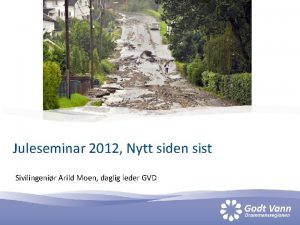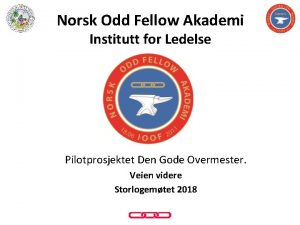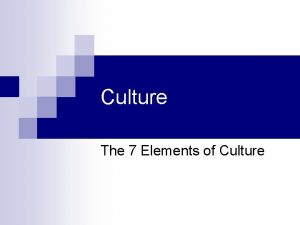International Management and Culture Arild Aspelund Outline Dealing













- Slides: 13

International Management and Culture Arild Aspelund

Outline • Dealing with people in a global setting • The cultural aspect – A practical example of International Joint Ventures Senter for entreprenørskap – Truls Erikson

International Management • International labor markets and global firms – – International worker mobility problems National management styles and practices National orientations Strategy and control • Headquarters – Subsidiary relationship – Local subsidiaries need people who can manage well locally – Headquarters need people who can coordinate and control worldwide – One need to find a trade-off… • Dealing with culture in cross-country negotiations and alliances Senter for entreprenørskap – Truls Erikson

The Cultural Aspects • What is culture? – The normative definition: The sum total of the beliefs, rules, techniques, institutions, and artifacts that characterize human populations – The behavioral definition: The collective programming of the mind • How do you get your culture? – Culture is taught through socialization processes – Socialization processes are the influence from parents, friends, education, and the interaction with a particular society – These influences result in patterns of behavior common to all members of a given society • A corporation might define such a society and hence define corporate culture Senter for entreprenørskap – Truls Erikson

Hofstede’s Four (five) Dimensions of Culture • Power distance – The extent that a culture excepts that power is unequally distributed – Generally low in Scandinavia – High in south America and France • Uncertainty avoidance – Degree to which members of a culture is uncomfortable with risk and uncertainty – High uncertainty avoidance in e. g. France, Argentine and Japan – Low in the US, Denmark, India and the UK Senter for entreprenørskap – Truls Erikson

Hofstede’s Four (five) Dimensions of Culture • Individualism – The extent to which people are supposed to take care of themselves and be emotional independent from others – Generally high in Scandinavia, the US and UK – Low in Indonesia, Thailand South America • Masculinity – The value attributed to achievement, assertiveness, and material success – High in Germany, Japan and the UK – Generally low in the feminine societies of the Scandinavian countries and the Netherlands Senter for entreprenørskap – Truls Erikson

Hofstede’s Four (five) Dimensions of Culture • Long-term Orientation – To what extent do people have a future-oriented perspective rather that focus on the present – Also labeled “Confucian dynamism”; developed by Chinese scientists – A response to the critique of the “Western Mindset” of Hofstede’s original IBM study – Long term orientation: • Persistence, ordering relationships by status and observing this order, thrift, having a sense of shame – Short term orientation: • personal steadiness and stability, protecting your ‘face’, respect of tradition, reciprocation of greetings, favors, and gifts – On this scale Norway and China are at the opposite ends… Senter for entreprenørskap – Truls Erikson

Trompenaar’s Seven Dimensions of Culture - A managerial extension of Hofstede • Universialism versus Particularism – Ex: A salesman that has not fulfilled his monthly sales quota due to sickness in his family – Universal reactions: The US, Canada and Switzerland – Particular exceptions: Korea, Russia and China • Individualism versus Collectivism – Are the rights and values of the individual dominant or subordinate of the collective society? – Individualists: Canada, the US, and Switzerland – Collectivists: Japan, Egypt and India Senter for entreprenørskap – Truls Erikson

Trompenaar’s Seven Dimensions of Culture - A managerial extension of Hofstede • Neutral versus Emotional – How much emotions are displayed at the workplace – Is it acceptable to make a significant investment from “gut feelings” and intuition? – No! Japan, Germany, Switzerland China – Yes! Italy and France • Specific versus Diffuse – Do hierarchies exist only at the workplace or does it exist also in the society outside the company? – Ex: Your boss ask you to paint his house over the weekend – NO! Australia and the Netherlands – ok…China, Japan, Singapore and India Senter for entreprenørskap – Truls Erikson

Trompenaar’s Seven Dimensions of Culture - A managerial extension of Hofstede • Achievement versus Ascription – Is your status in the organization tied to achievements that you have done, or your gender, age, education or social class (ascribed status)? – Merit in Scandinavia and the US, the UK and Canada – Ascribed in Egypt, Russia, Japan and France • Attitudes toward time – Time viewed as sequential steps or time viewed as synchronic (many things happen simultaneously) – Northern Europe are sequential (punctual and planning) – Southern Europe are synchronic and regard chronological precision as mere coincidence… Senter for entreprenørskap – Truls Erikson

Trompenaar’s Seven Dimensions of Culture - A managerial extension of Hofstede • Attitudes towards the environment – Some cultures try to control and subjugate the environment, others try to work with the nature – This is a dimension more related to religion and philosophy than national cultures – Historically the first is highly associated with western Europe and North America and the industrial revolutions • A short list of distinction between Hofstede and Trompenaar – Hofstede more related to national cultures and inevitably market selection decisions in marketing and offshoring decisions in sourcing – Trompenaar more related to management of multinational enterprises and more applicable to everyday managerial problems – Trompenaar is also more recent and had the benefit of looking at Hofstede’s work and some of the critique against it… Senter for entreprenørskap – Truls Erikson

Values and Alliances - An Application of Hofstede’s Framework • As we have seen , Dutch scientist have traditionally taken lead positions in the study of culture in international Business – Harry Barkema and Freek Vermeulen have been key contributors the past two decades • The current study seek to answer two questions – Which cultural differences are the most disruptive for the initiation and development of International Joint Ventures (IJVs)? – Are cultural values stable over time? • Unique data from 828 foreign entries of 25 Dutch multinationals in 72 countries, spanning from 1966 to 1994 Senter for entreprenørskap – Truls Erikson

Values and Alliances - An Application of Hofstede’s Framework • Results systematically point to differences in uncertainty avoidance and long-term orientation as key predictors of… – tendency to prefer international wholly-owned subsidiaries over IJVs – and long-term survival of IJVs • These factors dominate over differences in power distance, individualism, and masculinity • How would you explain these differences? • The study also show that the cultural dimensions are fairly stable over time Senter for entreprenørskap – Truls Erikson























